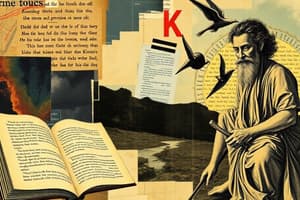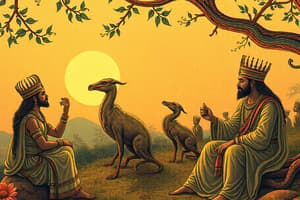Podcast
Questions and Answers
What are the main components necessary to study the Vedas?
What are the main components necessary to study the Vedas?
- Shiksha, Kalpa, Vyakarana, Nirukta, Chhanda, and Jyotisha (correct)
- Sutras, Aranyakas, Grihya-sutras, and Brahmana texts
- Samhitas, Upanishads, Nirukta, and Jyotisha
- Philosophy, Mahakavya, Shad Darshana, and Tantra Shastra
Which of the following texts is NOT part of the Vedas?
Which of the following texts is NOT part of the Vedas?
- Brahmana texts
- Mahabharata (correct)
- Upanishads
- Samhitas
What are the two primary Vedic texts that have influenced various forms of poetry?
What are the two primary Vedic texts that have influenced various forms of poetry?
- Upanishads and Grihya-sutras
- Charvaka and Nyaya
- Mahabharata and Shrimad Valmiki Ramayana (correct)
- Aranyakas and Kalpa-sutras
Which philosophy accepts the authority of the Vedas?
Which philosophy accepts the authority of the Vedas?
Which of the following best defines 'Mimamsa Shastra'?
Which of the following best defines 'Mimamsa Shastra'?
Which of the following is NOT classified under the six orthodox philosophies?
Which of the following is NOT classified under the six orthodox philosophies?
What is the main purpose of Tantras and Agamas in Indian literature?
What is the main purpose of Tantras and Agamas in Indian literature?
What is the significance of Shad Darshana in the context of Indian philosophy?
What is the significance of Shad Darshana in the context of Indian philosophy?
Which of the following components is NOT part of the eighteen fields of knowledge?
Which of the following components is NOT part of the eighteen fields of knowledge?
What is the purpose of Dharma Shastra in Indian literature?
What is the purpose of Dharma Shastra in Indian literature?
How many Vedangas are included in the eighteen fields of knowledge?
How many Vedangas are included in the eighteen fields of knowledge?
What is referred to as 'Adi Veda'?
What is referred to as 'Adi Veda'?
Which of the following is NOT considered one of the four Vedas?
Which of the following is NOT considered one of the four Vedas?
Which scripture is primarily associated with the compilation of the Vedic mantras?
Which scripture is primarily associated with the compilation of the Vedic mantras?
Which of the following accurately describes the Vedas?
Which of the following accurately describes the Vedas?
Which of the following is a mathematical aspect of Jyotisha Shastra?
Which of the following is a mathematical aspect of Jyotisha Shastra?
Study Notes
Indian Literature Overview
- Indian literature embodies the verbal representation of Indian knowledge with Vedas as its primary source.
- Divided into four Vedas, with each further branching into various texts including Samhitas, Aranyakas, Brahmanas, Upanishads, Kalpa-sutras, Shrauta-sutras, Dharma-sutras, and Grihya-sutras.
Vedic Components
- Each Veda features a 'Shiksha' text for sound and word understanding.
- To comprehend Vedic texts, study essential components: Shiksha, Kalpa, Vyakarana, Nirukta, Chhanda, and Jyotisha.
Historical Texts and Poetry
- Arsha Kavya, a significant literary category, includes extensive vocabulary.
- Key historical texts: 'Mahabharata' consisting of 100,000 shlokas; 'Shrimad Valmiki Ramayana' with 24,000 shlokas.
- Various poetic forms developed from these texts: Mahakavyas (epic), Khandakavyas (narrative), Sandesh Kavyas (message), Raga Kavyas (lyrical), and Stotra Kavyas (hymnal).
Philosophy in Indian Literature
- Philosophy provides insights into understanding Vedic principles alongside logic and arguments for truth establishment.
- 'Shad Darshana' comprises six orthodox philosophical schools: Sankhya, Yoga, Vaisheshika, Nyaya, Purva Mimamsa, and Uttara Mimamsa.
- Non-Vedic philosophies include Charvaka, Jain, and Buddhist perspectives.
- Mimamsa Shastra aids in interpreting Vedic sentences, while Nyaya Shastra emphasizes logic and argumentation.
- Vedanta philosophy explores concepts like soul, world, God, maya, and atma, with interpretations from various acharyas.
Tantra and Agama
- Includes Tantra Shastra and Agama Shastra, focusing on deities, creation, worship, and desires.
- 'Shaivagama', 'Shaktagama', and 'Vaishnavagama' are key texts within this category.
Puranic Literature and Dharma Shastra
- Eighteen Puranas and Upapuranas detail various deities and Vedic principles.
- Dharma Shastras encompass rules and prohibitions linked to Vedic dharma.
Knowledge Domains
- Grammar, lexicons, and Shabda Sphota highlight the importance of words in achieving liberation.
- Jyotisha Shastra (Astrology) involves predictive and mathematical elements.
- Ayurveda combines ancient and modern medicinal principles, while political science, music, and economics are vital facets of Indian literature.
Eighteen Fields of Knowledge (Ashtadasha Vidya)
- Noted in Yajnavalkya Smriti and Vishnu Purana, includes four Vedas, six Vedangas, and four shastras that bridge various fields.
- Vedic literature is considered apaurusheya, believed to be divinely revealed to rishis during deep meditation.
- Vedic mantras compiled by Vyasa Muni, known as Veda Vyasa, who divided them into four Vedas: Rigveda, Yajurveda, Samaveda, and Atharvaveda.
Six Vedangas Research
- The six Vedangas support effective understanding of the Vedas: Shiksha, Vyakarana, Nirukta, Jyotisha, Chhanda, and Kalpa.
Conclusion
- Indian literature is rich and diverse, reflecting extensive knowledge across philosophy, poetry, law, and various fields of study, rooted deeply in the Vedic tradition.
Studying That Suits You
Use AI to generate personalized quizzes and flashcards to suit your learning preferences.
Description
Explore the fascinating world of Indian literature with a focus on the Vedas. This quiz covers the main forms of Vedic knowledge, their division into four Vedas, and the various texts associated with each Veda. Delve into the components that aid in understanding the profound wisdom embedded in these ancient texts.




